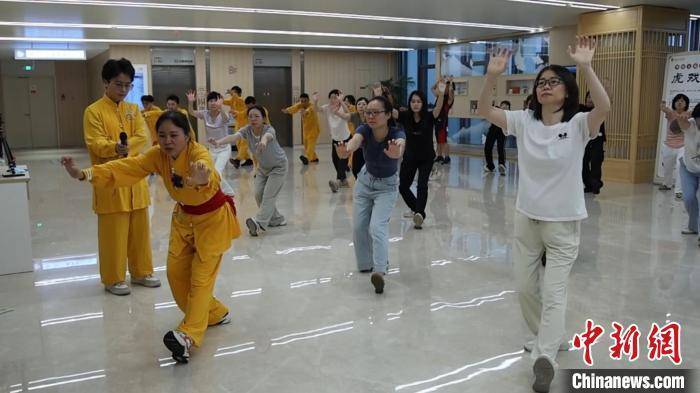Hangzhou, China, July 7 (by Zhang Yuhuan) “Arms up and forward, drawing arcs, then ten fingers curling into tiger claws, palms facing downwards…” Recently, in a quaint hall at Zhejiang Tengde Hospital, dozens of students were earnestly learning the Five Animal Frolics from a traditional Chinese medicine expert dressed in exercise attire. This year, the hospital opened a traditional Chinese medicine health night school, teaching techniques like the Five Animal Frolics, Yi Jin Jing, and Eight Section Brocade to help citizens effectively exercise and improve their health.
Class scene at the traditional Chinese medicine health night school. Photo by Xiao Jian
It is reported that the traditional Chinese medicine health night school opened 30 spots and attracted over 200 applicants. “Daily work is hectic, so I want to come after work to stretch my muscles and forget the noise and irritations of the day,” “I practiced the Eight Section Brocade following a video for some time and felt good, so I want to try learning the Five Animal Frolics,” “After turning 30, I started experiencing back and leg pain, cervical spondylosis, and more. The Five Animal Frolics is like ‘Chinese yoga,’ suitable for lazy people like me”… In the hospital’s public account comments section, applicants were enthusiastic.
During the class, the lead teacher and director of the Traditional Chinese Medicine Department at Zhejiang Tengde Hospital, Zhou Tianmei, acted as a “private coach,” breaking down each movement step by step. She explained, “‘Tiger Frolic’ focuses on tiger pounce and tiger lift. Through waist movements, it strengthens the waist and kidney functions. Regular practice can relieve symptoms like discomfort from prolonged work, adjusting both body and mind.”
“I thought it would be very simple and easy movements, but each move is quite particular. After practicing, my body feels warm and relieved, especially with the tiger claw movements!” Among all the students, Huang Ziyi, born in 2002, is the youngest. Just graduated from college and stepping into the workforce, she rushes to the hospital after work to attend the traditional Chinese medicine health night school.
“We often jokingly call ourselves ‘fragile young people,’ and it’s not an exaggeration at all. Like me, facing the computer all day long, inevitably leads to discomfort in the lumbar spine, neck, and shoulders after sitting for a long time.” Huang Ziyi confessed that as a post-2000s generation newcomer to the workforce, she has relatively low levels of physical activity, making the opportunity to attend the traditional Chinese medicine health night school rare. With a low learning threshold, she can motivate herself to exercise and maintain good health simultaneously.
Observing the scene, Huang Ziyi noticed that most students were young faces, with many other working professionals like herself attending after work.
Zhou Tianmei mentioned that the traditional Chinese medicine health night school is suitable for those interested in health maintenance or experiencing suboptimal health conditions, especially accommodating for working professionals. The committed exercise meets their dual needs of physical and mental recharge as well as health maintenance.
As the concept of traditional Chinese medicine health maintenance gains popularity, similar health night schools are springing up across China. Zhejiang Chinese Medical University’s Second Hospital, in collaboration with the Zhejiang Provincial Cultural Center, launched the new “Shanggong Study Hall,” offering popular courses on traditional Chinese medicine health maintenance, care, and beauty that have attracted thousands of applicants. Shengzhou Hospital in Shaoxing, Zhejiang, organizes health pole training courses to help young people address sleep-related health issues. The Shanghai School of Mass Art and Shanghai Shuguang Hospital affiliated with Shanghai University of Traditional Chinese Medicine have partnered to offer Chinese medicine courses, introducing bone-strengthening health courses tailored for young professionals.
Low barriers to entry, easy learning, no need for specialized facilities, and gentle movements are some reasons many young people favor “Chinese yoga” and traditional Chinese medicine health night school classes. Experts emphasize the importance of correct methods in traditional Chinese medicine health maintenance, advocating for “to each according to his capabilities.” Young people should choose appropriate health exercises and therapies based on their own physical strengths and weaknesses. (End)


